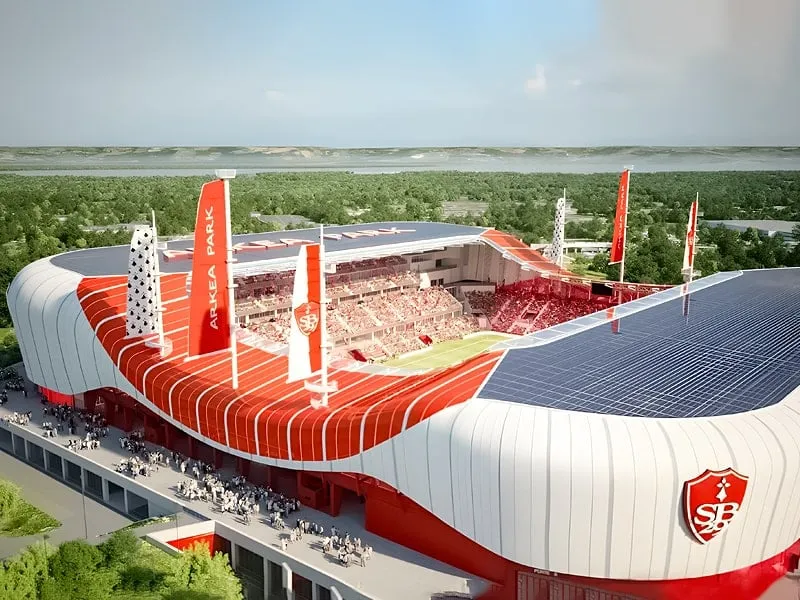On March 30, 2022, Ligue 1 club Stade Brestois announced plans for a new 15,000-seat eco-friendly stadium, named Arkéa Park, to replace the aging Stade Francis-Le Blé, their home since 1950. The nearly century-old venue no longer meets modern football standards, prompting the club to invest in a sustainable, state-of-the-art facility. “It’s complicated to stay at the highest level, and that’s what we’re going to try to do with this new tool,” said co-owner Gerard Le Saint, emphasizing the project’s importance for the club’s competitiveness in France’s top flight.
Sustainable Design and Maritime Identity
Designed by architect François de La Serre, Arkéa Park will be located in the Froutven commercial zone in Guipavas, just outside Brest, with construction planned from 2024 to 2026. The €85 million project incorporates innovative green technology, including wind turbines and photovoltaic panels, to harness prevailing winds for lighting and heating. The stadium’s aesthetic, featuring sails in the club’s red and white colors, reflects Brittany’s maritime heritage. “The aim is for the public to associate with the identity of a stadium,” De La Serre explained, aiming to create a regional landmark that resonates with fans.
A Strategic Capacity Choice
Brest mayor François Cuillandre highlighted the project’s pragmatic scale, noting, “We don’t want a half-empty stadium, so we’re building one that will be full all the time.” The 15,000-seat capacity mirrors the current Stade Francis-Le Blé, aligning with the club’s fanbase and ensuring vibrant matchday atmospheres. Positioned near major roads, cycle paths, and public transport, the stadium will enhance accessibility while integrating with the local community. Its strategic location opposite an IKEA and near a shopping center further boosts its potential as a regional hub.
A Boost for Brest’s Ambitions
Promoted to Ligue 1 in 2019, Stade Brestois, currently 13th with nine games left in the 2021-22 season, aims to solidify its top-flight status. The new stadium, expected to be operational by 2026, supports these ambitions by providing modern facilities to attract talent and fans. A victory in their upcoming match against Montpellier could secure another season in Ligue 1, aligning with the club’s forward-looking vision. The project’s emphasis on sustainability also positions Brest as a leader in eco-conscious sports infrastructure.
A Model for Future Stadiums
Arkéa Park’s blend of environmental innovation and cultural resonance sets a new standard for football venues. By prioritizing renewable energy and a capacity tailored to its fanbase, Stade Brestois is crafting a sustainable future while honoring its Breton roots. As construction approaches, the project promises to elevate the club’s profile and inspire other teams to embrace green initiatives, ensuring a lasting impact on both football and the environment.






